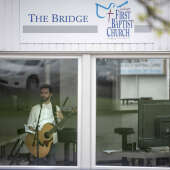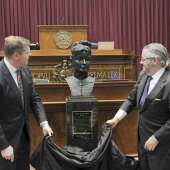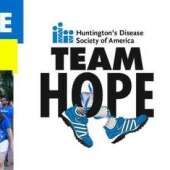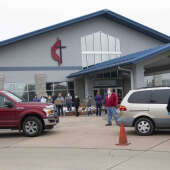Satire: The 48-Hour Lecture Project

Thanks to the pandemic, this year has brought a new kind of competition that is more social-distancing-friendly. In the "48 Hour Lecture Project", teams of aspiring educators are each given a random subject and have two days to research and produce a one-hour lecture on the topic. The end product is delivered by live video conference to an audience of jaded students.
Conducted during a recent weekend, a total of 64 teams from around the nation competed to showcase their skills at public speaking, showmanship, academic research, and curriculum development.
Well, that's what the teams thought they would be doing. The organizers, however, threw a curveball at the participants: the assigned subjects were generated by a slightly deranged Artificial Intelligence algorithm.
"We scraped phrases from actual college course catalogs," said event director Mark E. Desade. "But our AI combined the words in ways that were utterly bizarre. So the most important skill in this competition was to sound convincing about a subject that was totally made up."
Some of the randomly assigned lecture titles included:
* The Metaphysics of Midwestern Traditional Dance Customs: Ideas in Conflict
* Roman Architecture As Foreshadowing The Perils of 21st Century Artificial Intelligence
* Microbiology As Interpreted In Middle Class French Sculptures: The Untold Story
* Aquatic Ballet In Today's Society: A Symbol Of Babylonian Traditions
* Error 418 I'm A Teapot: AI Database Corrupted, Please Reboot System And Try Again
The top three winning teams displayed excellent skills at presenting hogwash, but also had the good fortune of drawing topics that weren't quite as ridiculous as others.
Here is a summary of the winners of this year's 48--Hour Lecture Project:
Third Place: "The Evolution of Conspiracy Theories: Darwinism in the Postmodern World"
Team Name: Piled Higher and Deeper
Hometown: Rachel, Nevada
"We were pumped when we drew this subject," said team captain Mennon Black. "It's amazing how fringe conspiracy theories have come to dominate political discourse these days. You'd almost think there was a conspiracy to perpetuate conspiracy theories."
The team approached the subject by analyzing how conspiracy theories are able to grow, mutate, and adapt over time.
During the lecture, the team explained, "At first we were told that 5G technology causes cancer, but then the conspiracy evolved to something more absurd: 5G technology now causes COVID-19. At this rate of mutation, it's only a matter of time before the Internet explodes with the claim that 5G causes hurricanes. Or male impotence."
The judges were impressed by the insightfulness of the lecture, but were concerned that the team didn't quite address the "postmodern" portion of the assigned subject.
"Let's face it, nobody actually understands postmodernism, so we just brushed that off," team member Faye Kuname admitted. "Oh well."
Second Place: "The 'Star Trek' Universe As Contemporary Mythology: A Process Approach"
Team Name: Boye Brothers of Berkeley
Hometown: Berkeley, California
This initially proved to be a tough subject for the team. Although all of the members happen to be science fiction fans, they are devoted to Star Wars and not Star Trek. But after frantically doing some Google searches and watching a few episodes of Deep Space Nine, they found their muse: the Ferengi.
In the Star Trek universe, the Ferengi are an alien species singularly focused on making profit. At the core of their belief system is a document called the "Rules of Acquisition."
"It's obvious the writers of Star Trek used the Ferengi as a vehicle for social commentary on the darker side of modern life," said captain Fann Boye. "Yet that interpretation seemed too obvious, so our team took a deep drive -- lasting all of 10 minutes until our Cheetos supply ran out -- into the hidden meanings of the Rules of Acquisition."
In the lecture, the team highlighted Rule #34 ("War is good for business") and Rule #35 ("Peace is good for business").
"This duality paradox is emblematic of the challenges faced by our contemporary economy," Boye said while somehow keeping a straight face.
The lecture also discussed other nuggets such as Rule #59 ("Free advice is seldom cheap"), Rule #190 ("Hear all, trust nothing"), and Rule #217 ("You can't free a fish from water").
The judges were bullish about the team's bull... er, creativity. "I'll never look at Star Trek the same way again," commented one judge. "Oh, it's still a soap opera in space, but it's not as vapid as most TV shows."
First Place: "Encounters in Epidemiology: Finding Common Ground Using Neo-Classical Research Paradigms"
Team Name: Procrastinators of the World, Unite! Maybe Tomorrow!
Hometown: Peculiar, Missouri
"I couldn't believe our luck in drawing such a timely subject. What a cakewalk!" exclaimed co-captain Pam Demmic after accepting the championship trophy. "We just had to make sure we didn't choke after being handed this thing on a silver platter."
Their lecture opened with a pre-recorded montage of the many false claims about the virus that have gone, uhh, viral on social media.
A somber narrator stated, "Since the start of the COVID-19 pandemic, it seems that everybody has turned into the world's foremost experts on epidemiology, virology, and public health policy. No matter what you do, the critics have been out in full force. If you take the virus seriously, you are labelled as a pansy who has fallen victim to fear-mongering propaganda. If you don't take the virus seriously, you are called an irresponsible fool who will doom us all."
The narrator paused before continuing, "You can, however, get the upper hand against these bullies. This lecture will give you irrefutable facts to win any argument, packaged in convenient memes that even those with short attention spans can't ignore. With these tools, we hope to unite the world under the common goal of truly defeating the virus. Or maybe you'll get banned from social media in the process. Either way, it's a win-win."
Then the lecture delivered a dozen brilliant arguments that covered almost every aspect of the public health crisis.
"This lecture blew me away," one judge complimented. "Now if you'll excuse me, I have some friends on Facebook that need their butts kicked."































